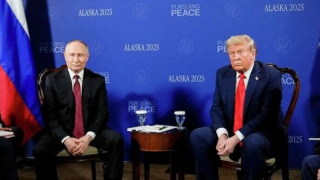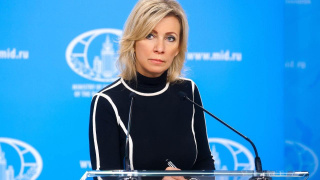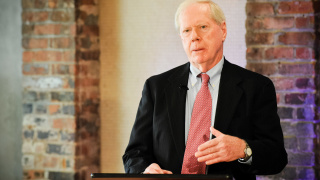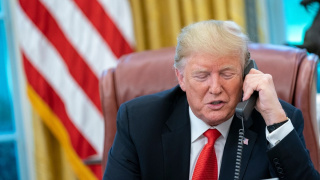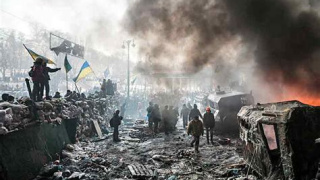Hotel Ukraine: ‘Sure, Check-Out Any Time, but You Can Never Leave’
(Lyrics from The Eagles’ Hotel California song)
“Welcome to the Hotel California
Such a lovely place …
They livin’ it up at the Hotel California
What a nice surprise
Bring your alibis”
And she said, “We are all just prisoners here
Of our own device”
And in the master’s chambers
They gathered for the feast
They stab it with their steely knives
But they just can’t kill the beast
… Last thing I remember, I was
Running for the door.
“Relax”, said the night man
“We are programmed to receive
You can check-out any time you like
But you can never leave!”
Well, the West is running for the door. But leaving the Ukraine consequence is not possible – ‘Relax’ Team Biden, the night man says; we are programmed only ‘to receive’. You can’t just ‘go’.
Mark Feygin, who daily hosts former Ukrainian Presidential adviser, Oleksiy Arestovich, on his show, sums up a general consensus:
“Biden and his administration want to end the war by the end of 2023. This is their settlement plan. I mean [the end to] the active military phase … [and] calmly to hold elections, even in January [2024], in February, but to finish it before the U.S. elections, so that Biden would have something to sell, so that he could say: ‘we saved Ukraine, Ukraine has been preserved as a state. A sovereign state. It is there. Yes, 18.6% of the territory is occupied, but more might [have been] occupied’: That’s what Biden needs, it’s very simple, there is no ‘mysterious casket here’.
This, however, represents but one of two ‘camps’ in the U.S.: the first proposes to freeze the conflict in place, and shout ‘Mission Accomplished’; and the second, to fight on, until Russia cracks, and flies the battle space.
It may seem so simple, but it isn’t. Neither U.S. hypothesis is soundly-based. One lesson from ‘conflict’ that I learned, early was that the ‘rationality’ that seems so plausible; – so logical to those coming from stable, ordered, prosperous states, and which was generally expressed as ‘why don’t they understand that continued violence is not their interest’; ‘Can’t they just ‘split the difference’ and move on’ – becomes incrementally more and more a minority position.
The distress, the pain of human loss, the angst of extended conflict, shapes a different mode of psyche: war psyche. It is one that does not readily accept the humanistic calculus. It wants the ‘other’ to suffer, as ‘they’ have suffered. The rationale of ceasefire, of acquiescing to ‘realism’, can seem inadequate psychologically, even if rational politically.
This aspect is well understood in other cultures, but less so in the West, where a more rigid logic holds sway. It is notable in the Ukraine case, that whilst the West engages in Byzantine rounds of talks amongst its allies, and allied think-tanks, to find consensus on some ‘off-ramp’ to the failing Ukraine project – the discussion remains tight within the western ‘bubble’.
There is little or no attempt to find out what the Russian government or people think; or more importantly what Moscow envisions, as Russia’s next steps (of course Russia keeps that close to the chest).
There is a silent assumption that when the West ultimately decides its ‘off ramp’, that the latter will be ‘grabbed with both hands’ by President Putin. Underlying this is the ‘article of faith’ that Russia is stuck in the conflict, and has few options beyond continued positional defence. Again, this is completely one-dimensional vision.
And this also is not the psyche of war, and the analysis thus is flawed: What may have been possible once (say in March 2023 in Istanbul), may not be possible again. War metamorphoses psychology in a direct relationship to the adversity of war, and to the extent of malevolence emanating from the oppositional side.
Simply put, prolonged conflict works as a ratchet – one that eats away at the room for compromise (for both parties).
In the case of Ukraine, the U.S., it seems, is tilting towards a more permanent (yet less intense) war. The so-called ‘Israeli formula’. New weapons and plenty of cash for Rump Ukraine – locked-in until the 2024 elections, and beyond, to avoid an evident retreat. By contrast, however, the need for an early political check-out, ahead of an ever polarising electorate, now seems more urgent than ever.
About two weeks ago, there was a face-off between three western top generals and the Ukrainian High Command. Unusually it was live (held somewhere in the vicinity of Lvov, reportedly). There is no public account of what was said, but reportedly the Ukrainians were instructed immediately to cease splitting their forces between Rabotino, Bakhmut (Artymovsk) and Kupiansk (in the north). They were urged instead to concentrate all their forces on the offensive directed south, toward Melitopol and the Azov Sea.
General Zaluzhny, the Ukrainian commander, reportedly repeated his opposition to betting all on a southern ‘push’ because of the heavy losses of men and armour that it would incur. However, the West’s Generals apparently brooked no delays. The Ukrainians, it seems, drew the conclusion that they are being readied to be ‘thrown under the bus’ (blamed for the ultimate offensive ‘fail’): ‘Your last chance’: Achieve a break-through towards the Sea of Azov was the message, or we, the West, will wash our hands of your military efforts, and you then will be forced to negotiate with the Russians. Is this bluff or real?
The ultimatum places Zelensky between Scylla and Charybdis monsters: On the Scylla side of the Strait is a patently failing offensive, and an army decimated by heavy losses. On the other side, Zelensky’s ultra-nationalist and neo-fascist colleagues are becoming angrier, and more radicalised; prohibiting any negotiation whatsoever with Russia.
Zelensky is beholden to these forces, which are both Russophobic and anti-western. The latter will insist to continue the war vs Putin – if not by conventional means, then through any false flag action which might try to force NATO into the war.
Zelensky therefore now has almost no space in which to manoeuvre. Team Biden may demand an early off-ramp negotiation with Russia, but this risks Zelensky being viewed as a traitor by his hard-right; or alternatively, being overthrown by a military that has had enough of ‘half-baked’ NATO plans that eviscerate Ukrainian armed forces, as well as Zelensky facing criticism as a western dupe by moderates such as Oleksei Arestovich.
These unbearable dichotomies might see the complete collapse of the regime and an unbreak of civil conflict within Ukraine.
Were these dynamics to accentuate, the U.S. might opt rather for negotiation with Russia: But what would they say? How will they respond, were Russia flatly to decline a ceasefire, and decline a frozen conflict along the present Contact Line?
Will Washington admit to Moscow that with a ceasefire, they would still hope to implant Rump Ukraine into NATO? And intend to rearm and fund Ukraine under the guise of ‘security guarantees’?
This is ‘bubble-think’, and the western bubble still does not ‘get it’: Russia will not, under any circumstance, allow the Ukrainian military to continue to exist, or NATO to enter the arena, whilst the ultra-nationalists and neo-fascists wield predominant influence in Kiev. Full Stop.
Moscow has other options to bring this conflict to a conclusion. Russia has been waiting to mount its own offensive (when Kiev’s is exhausted). And it possesses the technical means to bring Ukraine to a standstill. What happens then? Likely, a new government, ready to endorse Ukrainian neutrality. It will not be a simple process.
And, just as tensions in Kiev are set to escalate, so too they are escalating in Washington. Who is to be blamed for the failed offensive? Will it be the Ukrainians, or the Pentagon for slow weapons delivery; or the British for their exaggerated propaganda peddling inevitable and early victory?
But there is an internal U.S. dynamic here, set to shuffle the Ukraine ‘cards’: As the multiple criminal Indictments of former President Trump mount – and partisan efforts to knock him out from the 2024 election accelerate (albeit resulting in his mounting popularity) – the notion that Congress has no alternative to mounting a long-discussed impeachment Inquiry of President Biden are gaining traction.
Given the investigative impediments launched by the Department of Justice into the Hunter Biden investigation and the Department’s “refusal to expressly extend the special counsel’s mandate to the allegations of Biden family influence-peddling, there is little choice but to commence an impeachment Inquiry. The authority of the House is at its apex when carrying out its duties under the impeachment clause”, Professor Jonathan Turley writes.
Should this happen, Ukraine and the testimony of witnesses such as former Ukrainian Prosecutor, Viktor Shokin and the Burisma ‘whistleblowers’ testimony will be sure to feature prominently. Whatever the outcome to such a fraught process, the interest of the Democrat campaign managers likely will be to distance as far as possible the Ukraine offensive failure, and claims of corruption or money-laundering, from swaying the election outcome. They will want to ‘move on’.
The lyrics to Hotel California were supposed to be an allegory centred around the use of heroin – hence the refrain that ‘you may run, and try to check-out’, but you can never really leave.
When Victoria Nuland et al promoted the Maidan ‘revolution’, it was ‘as if’ they put the Ukrainian Far Right on ‘crack’. No doubt, she and her colleagues hoped that Ukraine would disembogue into Russia’s total demise. It didn’t happen. Instead, it has turned the world inside-out. ‘They may run’, but what they inadvertently sparked – the re-shaping of a new world order – ‘they can never leave’.

